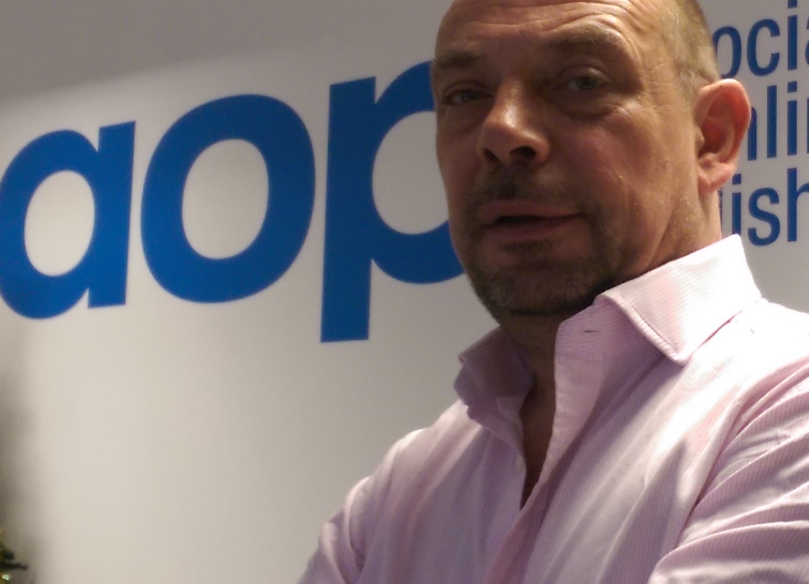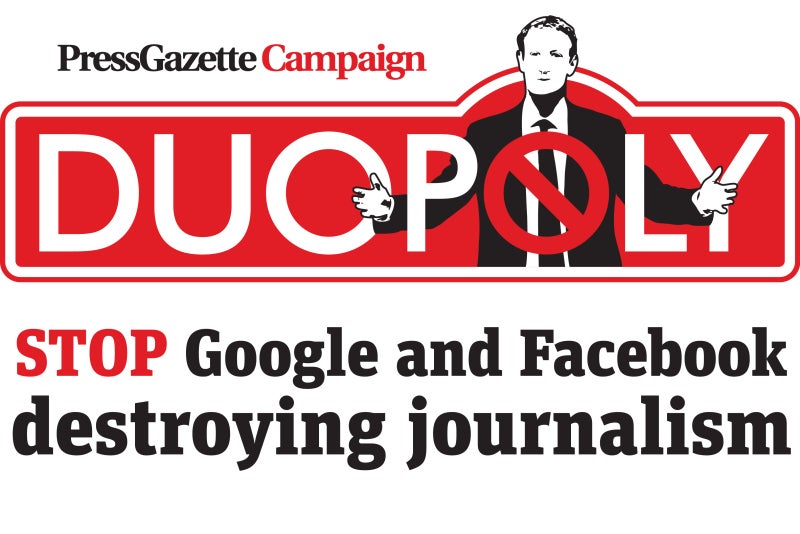
The head of UK trade body the Association of Online Publishers has warned of the risk that his members become “collateral damage” in the battle for digital supremacy between the digital media giants.
Richard Reeves spoke to Press Gazette as part of this title’s Duopoly campaign – which seeks to highlight concerns about the dominance of Google and Facebook in the online advertising market.
The pair take most of the £10.3bn a year spent on digital advertising in the UK and account for around 80 per cent of the growth. Press Gazette has been exploring concerns that this does not leave much space for advertising to support news publishers.
The AOP has 40 publisher members representing over 2,500 brands. Facebook and Google are associate members.
Asked whether he is sympathetic to the aims of the Press Gazette Duopoly campaign – which has the slogan “stop Google and Facebook destroying journalism” – Reeves said: “I’m sympathetic because there is a massive cost associated with creating quality original content. At the moment, users continue to be able to predominantly enjoy that content for free by virtue of the fact that it is ad supported.
“There was a conscious decision from the leading content creators, over 20 years ago, to enable users to access quality original content for free through the application of a model that would see advertising live alongside that content – a decision supported by the wider digital and advertising communities – something publishers continue to honour.”
He said that the entire industry must take some responsibility for current challenges to the online business model for publishers. The current situation is partly due to sustained pressure or “market forces” that have subsequently encouraged elements of “bad practice” such as poor user experience.
He said that added to that lack of consistency with regards to the “audience chasing” behaviour of ad buyers -adverts which target the web user whatever site they land on.
Reeves said this creates even greater “murkiness” and “confusion” around the way the digital industry deals with online advertising.
“You can’t deny that the likes of Google and Facebook have successfully developed simple uncluttered offerings, that provide reach and scale in a way that publishers struggle to compete with individually, that would naturally appeal to those responsible for not insignificant advertising spends.”
 But he said that publishers recognise that issues like ad blocking are a response to “poor user experience”, and and that there needs to be a focus on ad quality and viewability of adverts.
But he said that publishers recognise that issues like ad blocking are a response to “poor user experience”, and and that there needs to be a focus on ad quality and viewability of adverts.
He said: “We are trying to be pragmatic in the way we fight back not just the duopoly but inconsistencies in our industry.”
He said that publishers recognise the need to “work together on improving the standards of the advertising user experience”.
He said that in terms of scale, the publishers he represents as a collective can provide a scale and reach that is commensurate to that of the audiences of Google and Facebook. So once the inconsistencies surrounding industry ad-buying practices are addressed – in terms of accreditation, brand safety and independent verification – content creators will be better placed to compete for advertising budgets on a level playing field.
He said: “We need to demonstrate we can match the scale as a collective. In terms of quality, transparency and safety I don’t think anyone can match us.”
One of the key challenges, he said, is for publishers to find a way to collaborate around the data they hold on users which – collectively – is comparable to that gathered by Google and Facebook.
He said that there are signs that the big ad buyers, like Procter and Gamble, are placing more of a premium on the advertising standards that professional publishers can provide.
Reeves said: “The priority is not creating a single trading platform but creating an environment that enables publishers to compete for the more significant strategic part of the ad spend through a collaboration of that data that enables them to offer the scale the advertiser craves and the precision insight in terms of audience behaviour and understanding.”
And what can Google and Facebook do to provide publishers with what some might see as a fairer share of the money that’s made off the back of professionally produced digital content?
“We are satisfied we can compete on our own terms without ‘charity’. We remain firm in the belief that contextual environments are a crucial ingredient of the ‘brand story’, but in order to compete we need to get to a place where we are all competing on the same terms and being able to be held to account in the same way.
“The people that are publisher facing within both of those organisations are professional, those in ‘publisher support’ positions are good people and often go to great pains to try to do the right thing.
“Too often they are in for a kicking and I feel for them. They will go back and share those concerns – but the level at which those concerns are heard and acted upon, it’s debatable.
“My biggest issue is I am failing to be able to see any true transparency that supports the justification of some of the decisions they are making that do impact us.
“Those aren’t clearly coming from a place that is about driving and supporting a better advertising industry, and supporting and helping publishers to develop their opportunities.
“They are coming from a point that comes from them competing with the other two or three digital giants out there to maintain their dominance and their market share.
“Too often, where there would be practitioners within their organisations who are genuinely concerned in what we highlight as being challenges, they don’t have influence because – ultimately – that isn’t the agenda here.
“For example the agenda may be about maintaining browser audience share, and what the organisations see as much more important issues – and we are collateral damage.
“If we all start playing by the rules we might find it a more collegiate environment, less stressful and one that is more able to guarantee the future of original, quality content and the ability to invest in the creation of that.”
Email pged@pressgazette.co.uk to point out mistakes, provide story tips or send in a letter for publication on our "Letters Page" blog

